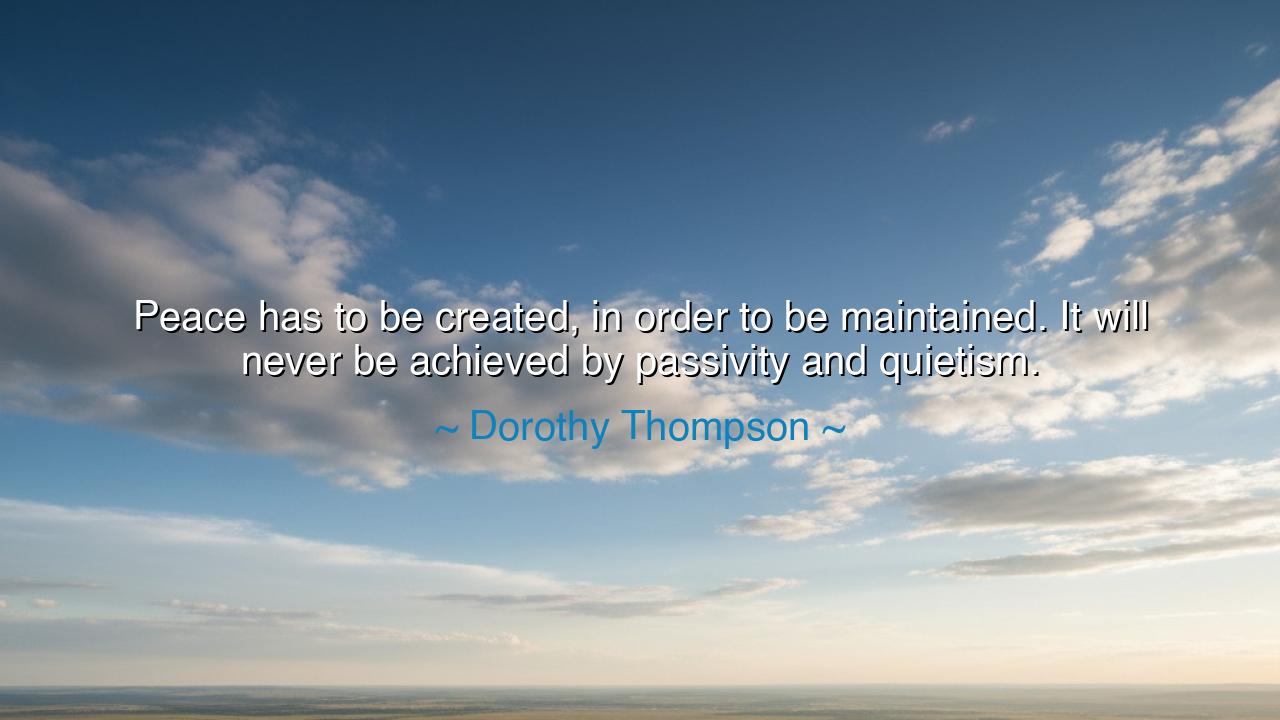
Peace has to be created, in order to be maintained. It will
Peace has to be created, in order to be maintained. It will never be achieved by passivity and quietism.






“Peace has to be created, in order to be maintained. It will never be achieved by passivity and quietism.” Thus declared Dorothy Thompson, the bold journalist and voice of conscience in the turbulent years before the Second World War. Her words strike like a hammer against complacency, reminding us that peace is not the absence of noise, nor the cowardly refusal to confront injustice. Rather, peace is a living construct, built by courage, vigilance, and the active labor of men and women who choose to stand against chaos.
When Thompson says peace has to be created, she speaks of peace as an art, a craft, a deliberate act of building. Just as a garden does not spring forth without seed, water, and toil, so too peace does not blossom in the world by mere wishing. It is the fruit of justice established, truth defended, and compassion enacted. Without this creation, silence is only the silence of oppression, and calm is only the calm of fear. Peace is alive only when it is shaped by human hands committed to righteousness.
Her warning against passivity and quietism is a cry against indifference. Too often, nations and individuals alike believe that avoiding conflict means preserving peace. Yet history shows the opposite: passivity allows evil to grow unchecked. Quietism permits cruelty to spread in shadows. The tyrant thrives when good men say nothing, when they convince themselves that stillness is virtue. Thompson, who spoke out against the rising tide of fascism when many in her time sought appeasement, reminds us that silence in the face of injustice is not peacekeeping—it is surrender.
History itself offers a clear example in the failure of appeasement before World War II. Leaders sought to preserve calm by yielding to aggression, believing that concessions would prevent bloodshed. But their passivity only emboldened the oppressor, and soon the world was consumed in flames. Contrast this with those who actively created peace after the war—building institutions, treaties, and alliances designed to prevent further catastrophe. Their efforts were not passive, but deliberate acts of construction. Peace endures only when it is guarded, defended, and maintained with vigilance.
On a smaller scale, this truth is no less powerful. In a family or community, passivity in the face of conflict allows bitterness to fester. True peace is not gained by ignoring wounds, but by addressing them—through forgiveness, through dialogue, through justice. To be passive is to let resentment grow until it explodes; to be active is to confront the hurt and to heal it. Just as nations must build peace, so too must individuals build it in their daily lives.
The lesson is plain: peace requires action. It demands that we speak when silence is easier, that we stand when retreat is safer, that we build when destruction is swifter. It is not a treasure stumbled upon, but a fortress constructed stone by stone. Each act of justice, each work of reconciliation, each step toward understanding is a brick in its foundation. And when built firmly, peace can withstand the storms of strife.
Practical wisdom flows from Thompson’s words: do not wait for peace to appear, but labor for it. In your home, confront disputes with courage and kindness. In your community, resist injustice, even in small forms, for unchecked cruelty always grows. In your nation, demand leaders who will create structures of fairness rather than pretend calm exists where it does not. And within your own soul, reject quietism that shrinks from struggle—embrace the hard labor of reconciliation and truth.
Thus, let Dorothy Thompson’s wisdom echo across time: peace is not passive—it is created, sustained, and guarded. Let us not mistake stillness for harmony, nor silence for safety. Instead, let us be artisans of peace, building it wherever we stand, so that it may endure not as a fragile silence, but as a fortress of justice, compassion, and truth.






AAdministratorAdministrator
Welcome, honored guests. Please leave a comment, we will respond soon